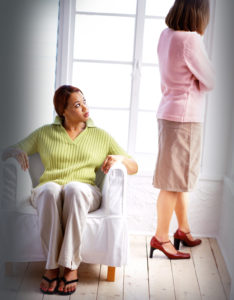 I am sitting on my office floor, old journals and photos spread around me. For the past hour, I have been reading my diaries from two decades ago to remind me of who I am and perhaps to provide a little perspective. As I sip wine and read about the events and feelings of my life as it was at age 22, it occurs to me that the relationship I was in at that time was emotionally abusive. I shake my head at some of the details: hearing constant lectures about how I needed to change, being told I had to just deal with some inappropriate behavior (like lying about paying the bills), and living with someone who was in a constant state of emotional shutdown or anger and the toll it took on my stomach and sleep. As my 44-year-old self reads the words from my youth, I shudder at the drama and stress that was my life then and feel a wave of gratitude for having the awareness and courage to leave that relationship. It hits me that I had absolutely no idea at the time that what I was experiencing was emotionally abusive. I knew it was bad, but I thought it couldn’t be abusive because I wasn’t being hit, yelled at, or cheated on. This naiveté is common in our youth, but what if we could better identify signs of emotionally abusive relationships that may not be so obvious sooner? Here I offer 3 signs of emotional abuse that we have a tendency to miss.
I am sitting on my office floor, old journals and photos spread around me. For the past hour, I have been reading my diaries from two decades ago to remind me of who I am and perhaps to provide a little perspective. As I sip wine and read about the events and feelings of my life as it was at age 22, it occurs to me that the relationship I was in at that time was emotionally abusive. I shake my head at some of the details: hearing constant lectures about how I needed to change, being told I had to just deal with some inappropriate behavior (like lying about paying the bills), and living with someone who was in a constant state of emotional shutdown or anger and the toll it took on my stomach and sleep. As my 44-year-old self reads the words from my youth, I shudder at the drama and stress that was my life then and feel a wave of gratitude for having the awareness and courage to leave that relationship. It hits me that I had absolutely no idea at the time that what I was experiencing was emotionally abusive. I knew it was bad, but I thought it couldn’t be abusive because I wasn’t being hit, yelled at, or cheated on. This naiveté is common in our youth, but what if we could better identify signs of emotionally abusive relationships that may not be so obvious sooner? Here I offer 3 signs of emotional abuse that we have a tendency to miss.
1. You feel constant fear.
I thought as long as I wasn’t afraid of my safety then all was good, and whatever went wrong was normal relationship stuff. But other than the occasional fear that pops up in conflict related to our past experiences, like the fear she’ll walk away, fear shouldn’t be present in a healthy relationship. You should not have to be afraid of saying something because you don’t know how she’ll react. That walking on eggshells feeling can be a different issue around how you each communicate, but if both people are invested and capable of improving communication skills, then that fear should dissipate over time.
 2. You are given lectures.
2. You are given lectures.
We all say things that aren’t so kind or helpful in conflict, but when there is a pattern of lecture giving, mostly about how you need to change, about what is wrong with you, or about how you should be, then it may be a sign of emotional abuse. In my abusive relationship, the pattern became predictable. We would have a conflict or disagreement, and at the point I shared my feelings (“I felt confused when you went off with that girl for 3 hours at the partyâ€), instead of listening or any of the other communication options available, she would begin lecturing me about how she needed more from me, how I should be a better friend to my friends, or something else she felt I needed to have explained to me by her. I now understand this behavior as deflecting and maybe even projecting, but at the time it just felt random and weird.
3. You are subject to the silent treatment.
Stepping away from conflict for a time period can be the best choice at times, but when the default response to communication is an angry silent treatment for long periods of time, it may be a sign of emotional abuse. The silent treatment, or stonewalling, according to an article in Psychology Today, is the refusal to consider your partner’s perspective and one of the leading indicators of couples who later split. Reading my own words, about days without speaking to one another, however minor the conflict, including when I requested help doing the laundry or meal planning, reminds me that though while I often still feel inept when it comes to difficult conversations, at least I have the awareness of my own emotions, the ability to use my voice, and to identify sooner when I’m being mistreated.
It is easy to identify signs of emotional abuse when they are happening to someone else, or when they are extreme, but abuse is abuse, even if the signs are more subtle. What I understand now is that while we all experience fear, moments of being told what to do differently, or live in post argument silence, it’s really the patterns over time and extremes around these behaviors that indicate emotional abuse. To read more about red flags in relationships, check out Girls’ Guide to Healthy Dating.


